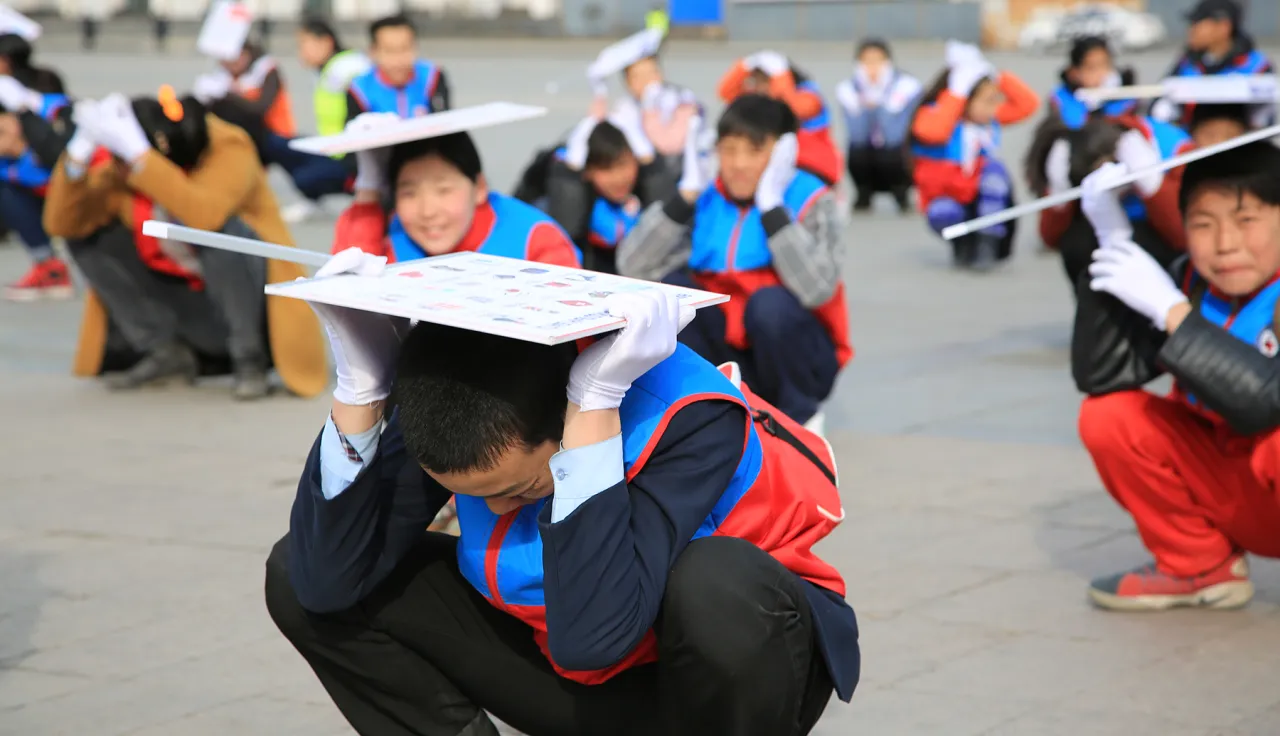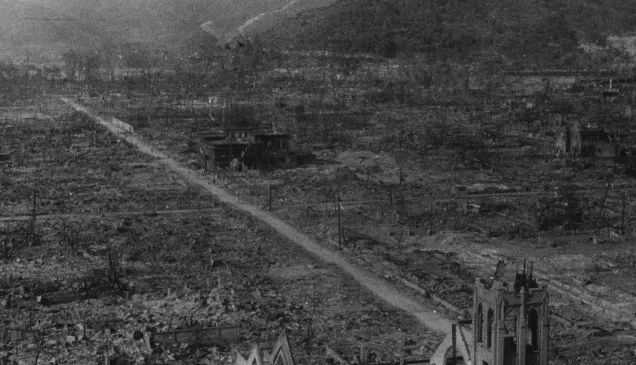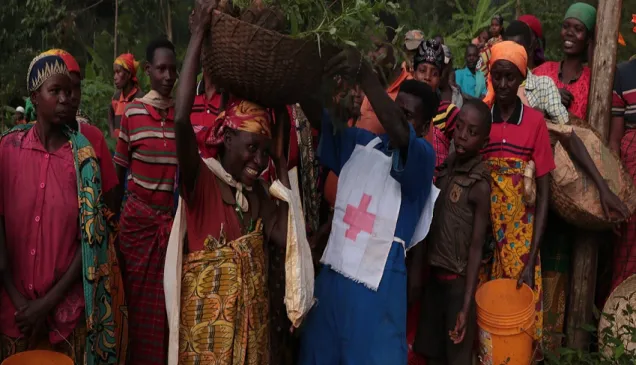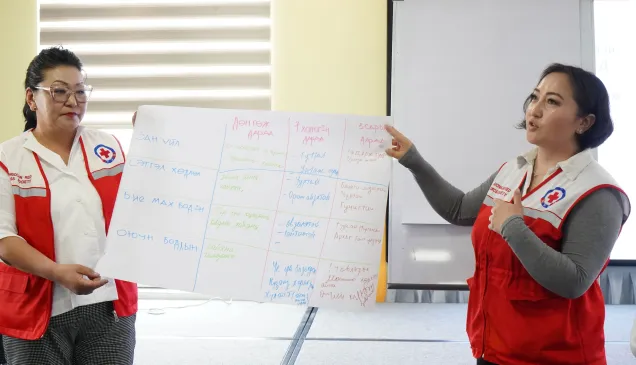Empress Shôken Fund Announces Grants for 2022

The Fund
The Empress Shôken Fund is named after Her Majesty The Empress of Japan, who proposed – at the 9th International Conference of the Red Cross – the creation of an international fund to promote relief work in peacetime. It is administered by the Joint Commission of the International Federation of Red Cross and Red Crescent Societies and the International Committee of the Red Cross, which maintains close contact with the Japanese Permanent Mission in Geneva, the Japanese Red Cross Society and the Meiji Jingu Research Institute in Japan.
The Fund has a total value of over 17 million Swiss francs and supports projects run by National Red Cross and Red Crescent Societies to benefit their communities in various ways. The first grant was awarded in 1921, to help five European National Societies fight the spread of tuberculosis. Since then, over 14 million Swiss francs have been allocated to 170 National Societies. The Fund continues to encourage new and innovative approaches with the potential to generate insight that will benefit the Movement as a whole. An innovation campaign was launched in December 2021 to further increase awareness of the Fund and what it stands for.
The campaign resulted in 52 proposals being submitted versus only 28 in 2021, and more innovative proposals compared to previous years, further strengthening the Fund's positioning as supporting innovation.
The imperial family, the Japanese government, the Japanese Red Cross and the Japanese people revere the memory of Her Majesty Empress Shôken, and their enduring regard for the Fund is shown by the regularity of their contributions to it.
The grants are announced every year on 11 April, the anniversary of the death of Her Majesty Empress Shôken.
For more information on the Empress Shôken Fund, please visit: www.shokenfund.org.
The selection process
The Fund received 52 applications in 2022, covering a diverse range of humanitarian projects run by National Societies in every region of the world. This year the Joint Commission agreed to allocate a total of 471,712 Swiss francs to 16 projects in Burkina Faso, Côte d'Ivoire, Croatia, Dominica, the Dominican Republic, Ecuador, Jordan, Libya, Mongolia, Niger, Portugal, Serbia, South Korea, Sri Lanka, Tanzania and Yemen.
The projects to be supported in 2022 cover a number of themes, including first aid and rescue, support for young people, disaster preparedness, health, social welfare and National Society development. The Fund continues to encourage new and innovative approaches with the potential to generate new insight and learning that will benefit the Movement as a whole. Reports from the National Societies whose projects were funded and implemented in 2020 generated insights in the areas listed below.
Top 10 key learnings from projects implemented in 2020
- Skills development
- Process improvement
- Adaptability and agility
- Leveraging synergies
- Project management
- Digitalization
- Change management
- Taking a pilot approach
- Aligning strategies
- Improving communications
The 2022 grants
The Burkinabe Red Cross Society plans to strengthen psychosocial care and the capacities of community volunteers and first-aiders in communities affected by the crisis. The grant will allow the National Society to assist victims of attacks by armed groups in areas where security is a challenge.
In 2017, over 43.8% of Ivorians were illiterate, and the disparities between men and women and by places of residence were enormous. The Red Cross Society of Côte d'Ivoire will use the grant to help improve the education and increase the autonomy of young women in the Bounkani Region who have not attended school.
The Croatian Red Cross will use the grant funds to spread awareness of the humanitarian ideals and educate children from an early age, through the Humanity Corner.
The Dominica Red Cross Society will provide support for and help introduce farming techniques and other solutions for managing climate change and other risks. The funds will be used to train 15 farmers as Agri First Responders in their community.
The Dominican Red Cross will help build young people's capacity to carry out local social support activities. The grant will be used to develop a virtual introductory course on planning and coordinating social support activities that is adapted to the young people's local reality, so that they are equipped with the techniques and tools to address the needs of their community.
The Ecuadorean Red Cross aims to identify and provide primary care for the negative feelings and emotions in young people from age 15 to 30 years in the city of Quito. The grant funds will provide immersion technologies to addresses the heightened need in the community owing to the COVID-19 pandemic.
The Jordan National Red Crescent Society has recognized young people and volunteers as the beating heart of the National Society, especially during the response to the COVID 19 pandemic, during which they served local communities across the country, when mobility was restricted. This grant will help them improve the management system for recruiting, developing, promoting and retaining volunteers to support humanitarian operations.
Libya is one of the countries most vulnerable to climate change, given its arid climate. This grant will help the Libyan Red Crescent raise awareness of the risks associated with climate change and highlight personal behaviours that could help mitigate these risks for communities.
The Mongolian Red Cross Society wants to use digital communication tools funded by the grant in order to help ensure there is meaningful community participation across all programmes and operations, improve its public relations management and strengthen its transparency and accountability to communities.
In the event of an accident, smartphones can provide information that is essential for providing effective first aid. Thanks to the grant, the Red Cross Society of Niger will educate and inform the public about how to store useful information in the "emergency call" section of their phones.
The Portuguese Red Cross will address young people's social exclusion and the lack of space and opportunities to develop relevant skills and digital literacy, through the Platforms of Change, funded by the grant.
Through the "Their life is in your hands" digital marketing campaign, funded by the grant, the Red Cross of Serbia will raise the general public's awareness of the value of CPR skills and AED use and provide the related training.
The Republic of Korea National Red Cross will focus on supporting disaster risk reduction in many countries in the Asia Pacific Region. The grant will fund development of virtual reality training content by the Asia Pacific Disaster Resilience Centre, provide sets of virtual reality devices to seven National Societies and provide virtual reality training on disaster risk reduction.
The Sri Lanka Red Cross Society is aiming for better nutrition and improved water, sanitation and hygiene in vulnerable communities that are drought-prone. The grant will introduce groundwater recharging practices into the catchment and tank ecosystem areas, to facilitate groundwater retention.
As the COVID-19 pandemic continues, communities face challenges in gaining access to reliable, up-to-date information and in overcoming the rumours, myths and misconceptions around the vaccine. Supported by the grant, the Tanzania Red Cross Society will develop a mobile application, "UJANJA KUCHANJA", to enhance information-sharing, build trust and increase information access and reach.
In a mountainous district of Yemen, frequent rockslides often injure people and domestic animals, disrupt transport networks and cut people off from their livelihood activities. Thanks to the grant, the Yemen Red Crescent Society will take measures to prevent rockslides and help reduce the number of victims and the damage caused.



